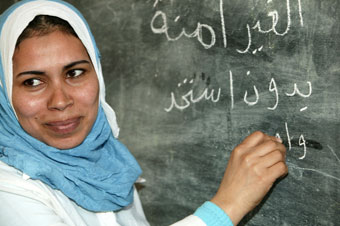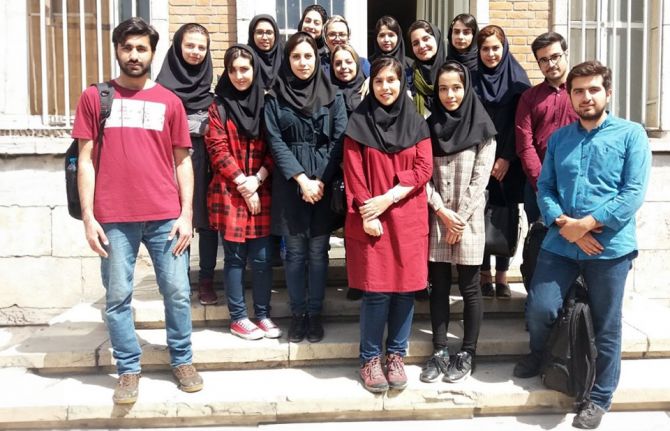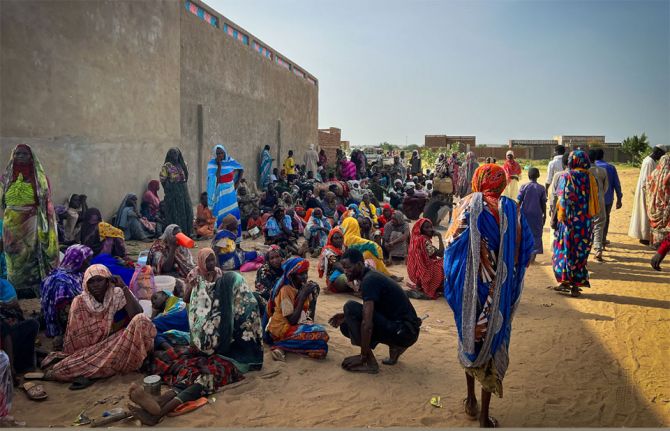
Feature Story
Hope for street children
12 January 2007
12 January 2007 12 January 2007
Dawn has just broken in Cairo, Egypt, but Ahmed is already out on the street. But unlike other children Ahmed is not on his way to school. Ahmed is 12 years old and left home when he was just six because his father in law didn’t want him in the house. After wandering from one house to another, he found that it was easier for him to live on the streets. At that time he didn’t realise that it was far more dangerous too. When the social workers of Hope Village found him, he had been beaten up, robbed many times and raped twice. Hope Village provided him with a safe place to stay and offered him much needed shelter, care and support. “We also enrolled him in an HIV session where he learned how HIV is transmitted,” said Nawara a sociologist at the Hope Village. “After what’s happened to him he is very worried that he could be positive himself,” she added.

Hope Village Society was initially created to provide shelter and support to orphaned children from one of Cairo’s poorer neighbourhoods. However, a fter two years, they realized that the local street children also needed a safe place to go where they could receive care and support so they opened a day care center. The inauguration of this centre in the Shubra district of Cairo was soon followed by many others including one in the district of Sayeda Zeinab where Ahmed and other young boys come to seek refuge and comfort when the streets of Cairo become too much for them.

Twenty three year old Nawara has been working at Hope Village for about a year. She said that although her job is very tough it is also very rewarding, “these boys really need our help” she said. “The most difficult case I encountered, she recalled, was one of an 11 year old boy whose father threw him off the window because he was being too loud. I go with the kids when they have their medical examinations and I am shocked by what I see on their bodies–– bruises, cuts, infected wounds––It’s difficult to imagine what these kids go through,” she said.
Khalid Dawoud has been working with Hope Village for the past 17 years. He set up the Sayeda Zeinab day care centre. “I know the story inside out and I know what those kids are subjected to,” he said.

During his experience with Hope Village, Khalid noted how interested the children were in knowing more about HIV because of the dangers they face, from sexual assaults to drugs, violence and prostitution. Sex, both forced and voluntary often takes place at and other deserted places. The girls are usually more at risk because they are abused by the older street boys, by the police and others. Some girls accept to have sex for a sandwich, others do it to ensure protection in return. “It’s critical…” said Khalid “…that they know how to protect themselves from HIV. When we announced that we would open a testing centre soon, all of the kids wanted to be tested to make sure they are not infected with HIV.”
With help from UNICEF and other sponsors, the Hope Village Society undertakes a wide range of activities from providing boys and girls with care and shelter to offering them psychological support, training and behavorial skills to help them reintergrate into society.

“Working with such initiatives is one of our priorities in Egypt,” said Maha Aon, UNAIDS Country Coordinator in Egypt. “We know how important and effective it is to focus interventions on people who are most likely to be exposed to HIV infection. One of the ways to protect street children is to help them understand where the risks are and how they can protect themselves in a way that they understand and which helps them care for and respect themselves.”
UNICEF, in collaboration with UNAIDS provides training on AIDS issues for the social workers at Hope Village . Nawara, who did the course in March said that the information she received and the methods of participatory teaching helped her a lot with the children. “We learned to use games to communicate information about HIV and about the dangers of life on the street, from an HIV perspective,” she said. AIDS awareness has become an integral part of the work carried out by Hope Village to help the children.
Dr Erma Manoncourt, Chair of the expanded Theme Group on HIV and UNICEF representative in Cairo said, “We need to mainstream HIV into existing programmes and develop programmes and interventions which focus on reducing the vulnerability of marginalized groups, including HIV prevention and impact mitigation,” she added. “We are reaching out to the private sector and other civil society entities and working with NGOs and community-based organisations, and at the same time, we collaborate with and support the Government. All these efforts are needed to make a difference for those who have no one else to care about them,” she concluded.
All photo credits: UNAIDS/P.Virot
Links:
Hope Village Society (Egypt)



